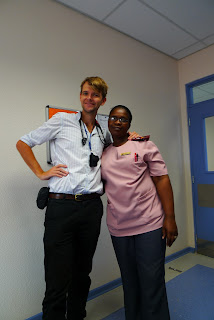I think I was feeling the strain a little when I wrote my last entry. This job can be a bit of an emotional roller coaster: last week I was getting a little frustrated; this week I have discovered a kind of love for working in the outpatient department. I never really thought I would say that. Before, I never felt satisfied with my management of patients with chronic diseases such as high blood pressure and diabetes. I struggled with many factors: I don’t have enough time to see patients; adherence to medication is a big problem; patient education is often below par and the language barrier doesn’t help – you should see me trying to teach my patients to use an asthma inhaler – the international sign language of pressing a puffer and inhaling at the same time just receives vacant looks or nervous laughter; local prescribing practice varies depending on who sleeps with the right pharmaceutical representative, or something like that – actually, I haven’t seen any pharmaceutical reps, but there are definitely favourite “brands” of drugs; lifestyle advice barely works – many of my patients (the ones without TB or HIV) would fit into the “obese” spectrum. The list could go on. But, I’ve realised, these issues are similar to the problems we get back in the UK. Secondly, I do believe that in the brief time I shall be here, I will help a few people. And, despite my occasional frustrations, we are doing the best we can in the current environment. What is better, the patients in general tend to be quite grateful. However, the biggest difference we as clinicians can do here is help the HIV programme and try to reduce the number of young boys and girls needlessly dying of AIDS. I think I have signed ten certificates already this week and they were all HIV related deaths and most of them under thirty years old.
In addition to the happy vibes in the outpatient department, as if by magic, a new doctor has arrived. Hooray. He seems to have come from nowhere – but actually, he grew up around Holy Cross. Within a week of hearing rumours of a local Xhosa speaking doctor, he has arrived. I think we are all quite anxious – this hospital really needs local South Africa doctors to run it; however, this guy has turned up with no CV or reference: the management have just employed him purely on the fact, as far as I can gather, that he went to school here. However, I’m keeping my fingers crossed that the reason his transfer was so quick is because he is being head hunted in every state and the management didn’t want to let his offer slip. I’ll keep you posted.
***
Something that is seen daily in the department are people that have large collections of fluid on only one of their lungs (a unilateral pleural effusion). The commonest cause of this fluid is TB – so, if the history fits (cough and nights sweats for more than two weeks) we start TB treatment and check their HIV status, if it hasn’t been done already. If the mass of fluid is very big then we drain some of it off – this release in pressure can really help ones breathing as the half of their lung that was being squished is put back into use again exchanging oxygen for carbon dioxide down in those alveoli fellas. Chest drain kits are rather expensive. So, what we do is stick a large cannula into the fluid filled cavity and attach it to a urinary catheter bag via an intravenous catheter giving set. It works pretty well most of the time.
***
Kids are always getting into mischief. I remember getting several things stuck up my nose or in my ears as a toddler. Things are no different here – no, I’m not shoving cotton wool buds up my nose, but yes, there are plenty of children doing similar things. I have fished out plenty of beans, beads and buds. However, nothing has matched what I fished out last week. It was not so much of what I extracted, but the smell that came with it. A mother had brought her six year old in with a history of a discharging right nostril, but no real history of a foreign body. Initially I thought there was something growing in there. However, as I pronged inside, with the child carefully sedated, I retrieved a 3 cm section of green, snotty sponge. What hit the nurse and I wasn’t the sight, but the rotten odour. I nearly gagged and my colleague had to leave the room. I like to think I have a pretty strong nose – it is constantly fighting off the fetor of rotten feet, halitosis, crap, piss, boils and blood – but this, this was something else.
I am off on holiday for the next three weeks – I shall be treating my Mum to a safari and Cape Town extravaganza. Hopefully, my nose will have a nice break too.
 |
| You may not have noticed, but I am getting very excited about my vegetable plot. |
 |
| The lovely sisters and staff of OPD/casualty |
 |
| The Eastern Cape: 100 cows for each person. They are nick-named "Transkei Robots." - robot is another word for traffic light. |
 |
| My neighbours and I on a particularly quiet weekend on call. |
 |
| Improvised chest drain with some very strange milky fluid coming out - I was as confused as the patient was (and no, it was not pus). |
 |
| Me and one of my favourite paediatric Sisters. |
No comments:
Post a Comment